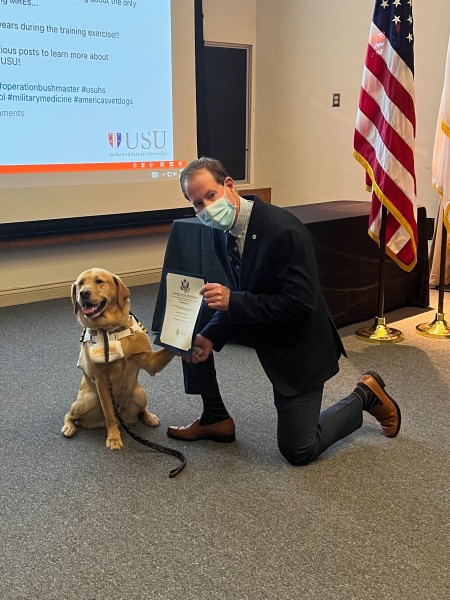- August 17, 2022
- No Comment
- 5 minutes read
First medical school facility dog, ‘Cmdr. Shetland’, to retire and em-bark on a new career – Newswise

Dr. Eric Elster, dean of the Uniformed Services University’s School of Medicine, presents Navy Cmdr. Shetland with a certificate of achievement during the facility dog’s retirement ceremony Aug. 16.
Newswise — Bethesda, Md. – The Uniformed Services University of the Health Sciences (USU) bid fair winds and following seas to its facility dog, Navy Cmdr. Shetland, after 21 (dog) years of service to students, faculty and staff. Cmdr. Shetland retired from active duty on Aug. 16 in a traditional Navy ceremony, where he was recognized for his ‘pawsitive’ influence on the university’s community.
Shetland, a Golden Labrador Retriever mix, began his naval career as a lieutenant commander upon arrival at USU in September 2019, making the university’s School of Medicine the first medical school to have a permanent, “live-in” facility dog. During his tenure, he has promoted wellness on campus while teaching the benefits and responsible use of Animal Assisted Interventions in health care, referred to more broadly as pet therapy. In September of 2021, Shetland was promoted to Navy Commander.
Facility dogs, like Shetland, are often initially trained to serve as service dogs and perform tasks for people with disabilities, supporting individuals with low vision, even mitigating the effects of post-traumatic stress disorder. Shetland underwent several months of training with America’s Vet Dogs before he was selected as USU’s facility dog almost three years ago. He then completed several more weeks of training to ensure he was prepared for and acclimated to his new “home,” where he has been making the rounds and working to fulfill his mission at the University. Therapy animals, in contrast to service and facility dogs, are personal pets with great dispositions that provide comfort and affection in a variety of settings to help improve social, emotional, and cognitive functioning.
“When we started the facility dog program and brought Shetland to USU, I knew the program would be successful, but I had no idea how impactful it would be, and it is largely because of Shetland,” said Dr. Kameha Bell, assistant dean for USU’s Well-Being Program and Shetland’s custodian. “He is somehow able to showcase his exemplary skills, while simultaneously displaying his sense of humor and flair for drama in a way that pulls people in. Shetland provided USU with energy and soul that we didn’t even know we were missing. He has definitely set the bar high for any dogs that follow in his footsteps.”
Animal Assisted Interventions are known to be a tremendous asset to patient care, especially when it comes to military troops who often have unique health care needs. Bringing Shetland to USU has allowed students to gain firsthand experience and exposure to Animal Assisted Interventions and, therefore, learn how to use facility dogs responsibly while understanding the benefits of using them. As students at USU graduate to become military health care providers, they understand when and how facility dogs are beneficial to the care of their future patients — providing yet another way of supporting the unique needs of service members and their families. This is also beneficial as many of the military’s medical treatment facilities have full-time facility dogs as well.
In addition to employing the next generation of health care providers to use a more holistic and integrative approach to medicine, Shetland has also been an asset to the University’s wellness program, which includes year-round activities geared toward promoting strategies to mitigate and reduce the causes and effects of burnout in all settings and career stages. Through direct contact with students, faculty, and staff, Shetland has offered yet another way of reducing stress with his emotional support, on-command hugs, fist-bumps, and even his strong sense of humor.
In February 2022, USU welcomed a second facility dog, Grover, a two-year-old black Labrador named after a decorated WWII veteran, and is anticipating the addition of another one in the near future. The university also plans to continue incorporating the use of facility dogs into its curriculum, as the school remains dedicated to finding new ways to meet the unique needs of our military.
Following his retirement, Shetland will settle in South Dakota, where he will continue his service to his fellow military veterans through support to local VA medical facilities. Shetland’s fans will still be able to continue to follow his adventures on Instagram @shetlandthewellnesspup.
# # #
About the Uniformed Services University of the Health Sciences: The Uniformed Services University of the Health Sciences, founded by an act of Congress in 1972, is the nation’s federal health sciences university and the academic heart of the Military Health System. USU students are primarily active-duty uniformed officers in the Army, Navy, Air Force and Public Health Service who receive specialized education in tropical and infectious diseases, TBI and PTSD, disaster response and humanitarian assistance, global health, and acute trauma care. USU also has graduate programs in oral biology, biomedical sciences and public health committed to excellence in research. The University’s research program covers a wide range of areas important to both the military and public health. For more information about USU and its programs, visit www.usuhs.edu.
Newswise gives journalists access to the latest news and provides a platform for universities, institutions, and journalists to spread breaking news to their audience.
Newswise, Inc

